
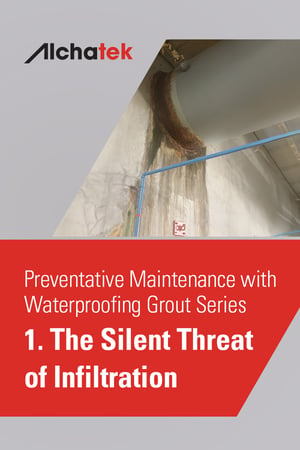 In the realm of property management and building maintenance, certain risks lurk unseen, often underestimated in their potential for destruction. Among these, water infiltration stands as a silent, insidious threat. Its capacity for causing extensive, sometimes catastrophic damage is not to be overlooked.
In the realm of property management and building maintenance, certain risks lurk unseen, often underestimated in their potential for destruction. Among these, water infiltration stands as a silent, insidious threat. Its capacity for causing extensive, sometimes catastrophic damage is not to be overlooked.
The Unseen Enemy: How Water Infiltration Works Against Structures
Water infiltration might not grab headlines like a fire or an earthquake, but its effects can be just as devastating over time. It usually starts small - a tiny crack here, a small leak there. Unnoticed or ignored, these minor issues can evolve into significant structural problems. Water seeps into the foundations, walls, and other critical parts of a building, gradually eroding the integrity of the structure. This process is slow, often going undetected until it's too late.
Real-World Consequences: The Champlain Towers South Collapse
A stark reminder of the catastrophic consequences of ignoring water damage is the tragic Champlain Towers South collapse in Surfside, Florida. While the final investigation report is yet to be fully conclusive, early findings pointed to long-term water damage as a significant contributing factor. This tragedy underscores the necessity of regular inspections and maintenance to detect and address water infiltration issues before they escalate into dire consequences.
Real-World Consequences: The Ann Street Parking Garage Collapse in Manhattan
Adding to the list of cautionary tales is the recent collapse of a parking garage building in the Financial District of Manhattan, New York City. On April 18, 2023, the second floor of the Ann Street Parking Garage partially collapsed onto the first floor, tragically claiming one life and injuring others. The garage, with a history of building violations dating back decades, including concrete defects and cracks, highlights the grim repercussions of neglecting maintenance and ignoring signs of structural weakness. This incident, leading to evacuations and a city-wide mandate for parking garage examinations, is yet another powerful example of the destructive potential of water infiltration and structural neglect.
Silent Yet Destructive: The Underlying Impact of Water Damage
Water damage isn't just about the immediate effects of a leak. Its impact is multifaceted, affecting everything from the building's structural integrity to the health of its occupants. Continuous water exposure can lead to the corrosion of steel reinforcements, the deterioration of concrete, and the growth of mold and mildew. These issues not only compromise the safety of the structure but also pose health risks, particularly in the form of respiratory problems caused by mold spores.
Why Prevention is Key
The most effective strategy against water infiltration is prevention. Regular maintenance and early detection are vital in mitigating the risks associated with water damage. Property owners and managers should prioritize regular inspections, looking out for signs of water damage like discoloration, mold growth, or pooling water. Early intervention can save not only significant repair costs but also lives.
Heeding the Silent Warning
The lesson here is clear: water infiltration, while silent and often unnoticed, is a formidable enemy against the longevity and safety of our structures. By understanding the potential dangers and committing to regular preventative maintenance, we can protect our buildings and, more importantly, the lives within them.
Want more information on sealing leaks with polyurethane grout?



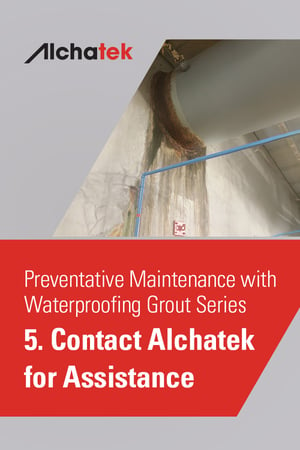 Alchatek's role in the fight against water damage is defined by expert technical guidance and specialized contractor referrals.
Alchatek's role in the fight against water damage is defined by expert technical guidance and specialized contractor referrals.



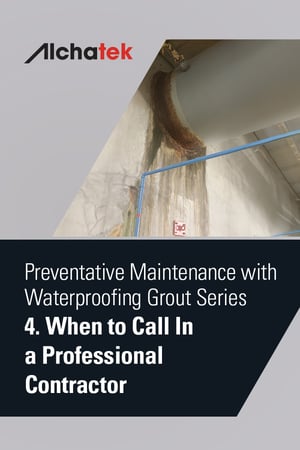 Water infiltration, even in its smallest form, can be a harbinger of more significant issues. The key is not to wait until the problem becomes extensive or recurrent but to seek professional assessment and intervention at the first indication of water presence.
Water infiltration, even in its smallest form, can be a harbinger of more significant issues. The key is not to wait until the problem becomes extensive or recurrent but to seek professional assessment and intervention at the first indication of water presence.
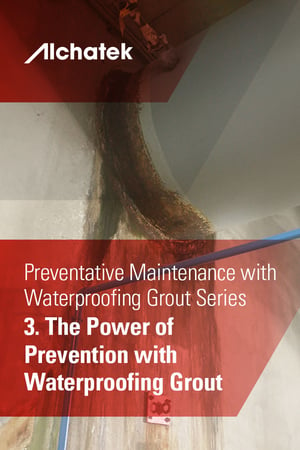 Polyurethane waterproofing grout is a type of sealant used extensively in construction and maintenance for its exceptional ability to prevent water ingress. It is a liquid polymer that, once applied, solidifies into a durable, water-resistant barrier. This grout is particularly effective in sealing cracks, joints, and other potential points of water entry in structures.
Polyurethane waterproofing grout is a type of sealant used extensively in construction and maintenance for its exceptional ability to prevent water ingress. It is a liquid polymer that, once applied, solidifies into a durable, water-resistant barrier. This grout is particularly effective in sealing cracks, joints, and other potential points of water entry in structures.
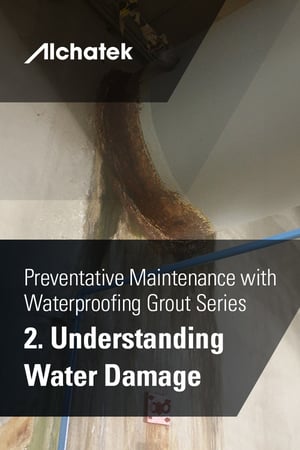 Water's destructive capacity stems from its ability to penetrate and alter the very materials that buildings are made of. Here are some key ways in which water inflicts damage:
Water's destructive capacity stems from its ability to penetrate and alter the very materials that buildings are made of. Here are some key ways in which water inflicts damage:
 In the realm of property management and building maintenance, certain risks lurk unseen, often underestimated in their potential for destruction. Among these, water infiltration stands as a silent, insidious threat. Its capacity for causing extensive, sometimes catastrophic damage is not to be overlooked.
In the realm of property management and building maintenance, certain risks lurk unseen, often underestimated in their potential for destruction. Among these, water infiltration stands as a silent, insidious threat. Its capacity for causing extensive, sometimes catastrophic damage is not to be overlooked.
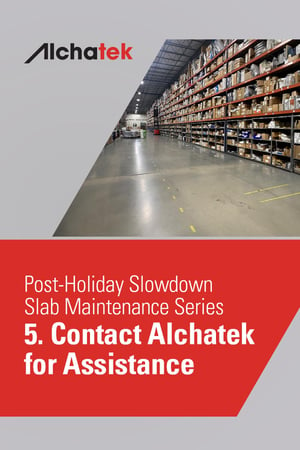 Alchatek, with its expertise in commercial property maintenance, stands ready to provide comprehensive support in addressing your concrete slab needs.
Alchatek, with its expertise in commercial property maintenance, stands ready to provide comprehensive support in addressing your concrete slab needs.

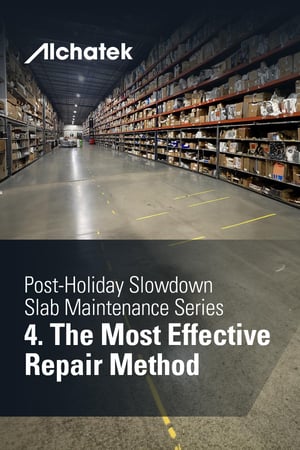 After identifying issues with concrete slabs in your commercial property, the next step is choosing the right repair method. The post-holiday slowdown offers the perfect timing for such repairs, and understanding the available solutions is key to making an informed decision.
After identifying issues with concrete slabs in your commercial property, the next step is choosing the right repair method. The post-holiday slowdown offers the perfect timing for such repairs, and understanding the available solutions is key to making an informed decision.
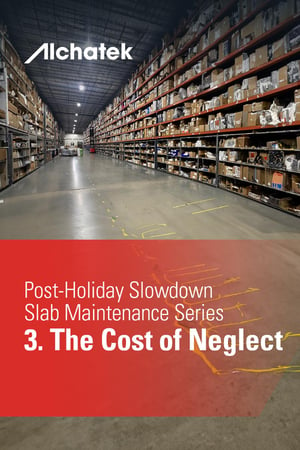 After a bustling holiday season, commercial properties may be left with more than just the usual wear and tear. One critical but often overlooked aftermath is the potential damage to concrete slabs. One thing is certain, ignoring the problem is a lot more expensive than doing something about it.
After a bustling holiday season, commercial properties may be left with more than just the usual wear and tear. One critical but often overlooked aftermath is the potential damage to concrete slabs. One thing is certain, ignoring the problem is a lot more expensive than doing something about it.
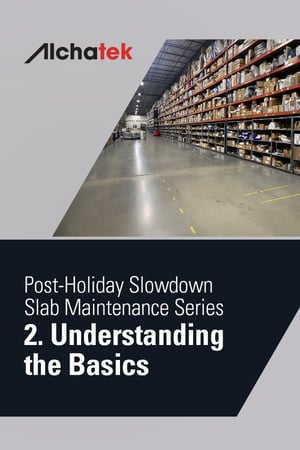 Concrete slabs are essential in providing a stable base for flooring in warehouses, retail showrooms, and other commercial spaces. However, despite their durability, concrete slabs are not immune to problems. Over time, they can become unlevel due to various factors like soil settlement and heavy loads.
Concrete slabs are essential in providing a stable base for flooring in warehouses, retail showrooms, and other commercial spaces. However, despite their durability, concrete slabs are not immune to problems. Over time, they can become unlevel due to various factors like soil settlement and heavy loads.
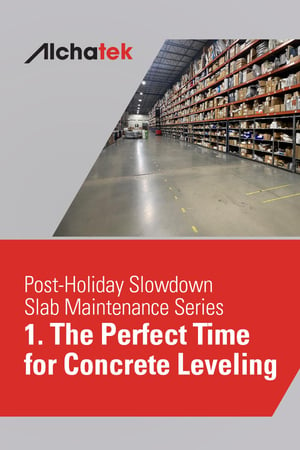 As the holiday season winds down and the festive decorations are packed away, commercial property owners and managers find themselves in a unique period of the year – the post-holiday slowdown. This quieter time offers an ideal opportunity for essential maintenance tasks, particularly addressing one of the most common yet overlooked issues: unlevel concrete slabs.
As the holiday season winds down and the festive decorations are packed away, commercial property owners and managers find themselves in a unique period of the year – the post-holiday slowdown. This quieter time offers an ideal opportunity for essential maintenance tasks, particularly addressing one of the most common yet overlooked issues: unlevel concrete slabs.